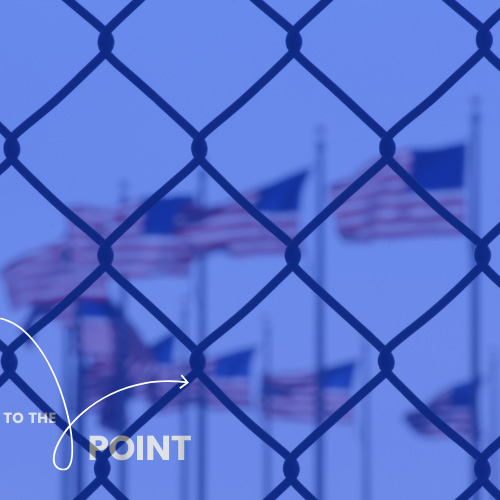To the Point: Donald Trump Indicted in Georgia — What Does This All Mean?
 To the Point provides insights from AU faculty experts on timely questions covering current events, politics, business, culture, science, health, sports, and more. Each week we ask one professor just one critical question about what’s on our minds.
To the Point provides insights from AU faculty experts on timely questions covering current events, politics, business, culture, science, health, sports, and more. Each week we ask one professor just one critical question about what’s on our minds.
On Monday, August 14, former president Donald Trump and 18 associates were indicted in Georgia over their alleged efforts to illegally overturn his 2020 election loss in the state.
Prosecutors charged Mr. Trump and his associates under the state’s “RICO” (Racketeer Influenced and Corrupt Organization Act) statute, which is traditionally associated with organized crime trials, though it has been used in recent years in white-collar crime and political corruption cases. In short, the former president, his lawyers, and aides are accused of a “criminal enterprise” to keep him in power.
We turned to Allan J. Lichtman for his opinions on these events and what makes these indictments different from the previous ones. Lichtman is an American University Distinguished Professor of History and the author of 11 books including The Case for Impeachment (Dey Street Books, 2017). He appears on Lichtman Live every Thursday at 7 p.m. EST at @allanlichtmanyoutube.
Former President Donald and 18 associates have been indicted in Georgia under the RICO statute: What does this mean, and how is this indictment different from previous ones?
The Georgia indictment of Donald Trump and his alleged co-conspirators is profoundly significant. Fulton County DA Fani Willis issued her indictment under the RICO statute that is most often used against organized crime. The DA is alleging that Trump and his enablers were engaged in a criminal conspiracy. They aimed at stealing an election and sabotaging democracy, actions no less significant than a Mafia-led conspiracy.
The Georgia indictment elaborates most clearly and fully the astonishing scope of the alleged Trump-led conspiracy, which extended from Georgia to Arizona. The conspirators, she charged, created fraudulent slates of Trump electors, illegally accessed voting machines, pressured legislators and state officials to alter election results, pressured DOJ officials to falsely claim evidence of a stolen election in Georgia, and pressured the vice president to unilaterally hand the election to Trump. Trump and his personal lawyer Rudy Giuliani ruined the lives of two African American election workers by viciously defaming them as notorious fraudsters. According to an investigation by the Georgia Elections Board, Giuliani claimed that there was a video circulating showing “Ruby Freeman and Shaye Freeman Moss ... quite obviously surreptitiously passing around USB ports, as if they're vials of heroin or cocaine." Willis further charges that the conspirators sought to cover up their crimes with lies and false documents.
If convicted, Trump and his alleged conspirators face prison time, not just home confinement. Under RICO in Georgia, the minimum sentence is five years in prison. This is a state crime, and no president has the power to pardon convicted felons or commute their sentences.
The indictment is not a sad day for America. It is an exceptionally good day because it is likely to hold accountable those who put their personal benefits above their country. Other leading Republicans, with few exceptions, have blamed the prosecutors for the misdeeds of Trump and his cronies. Notably, none of his defenders have claimed that Trump and the co-conspirators did not do the deeds for which they are charged.
Trump will attempt to try this case in the media. He has promised to deliver yet another pack of lies about a stolen election. He will continue to luridly defame the prosecutor and claim victimhood. Trump too played on African American stereotypes, calling Willis a “young racist” who had an affair with a gang leader. All of this will be unavailing in court, where evidence and proof, not political posturing, prevail. Trump can huff and he can puff, but he can’t blow the courthouse or the prison bars down.
About Professor Allan J. Lichtman

Professor Lichtman received his PhD from Harvard University in 1973 with a specialty in modern American history and quantitative methods. He became an Assistant Professor of History at American University in 1973 and a Full Professor in 1980, and a Distinguished Professor in 2011. He received the Scholar/Teacher of the year award for 1992-93. He has published 11 books and several hundred popular and scholarly articles. He has lectured in the US and internationally and provided commentary for major US and foreign networks and leading newspapers and magazines across the world. He has been an expert witness in some 100 civil and voting rights cases. His book, White Protestant Nation: The Rise of the American Conservative Movement was a finalist for the National Book Critics Circle Award in nonfiction. His co-authored book with Richard Breitman, FDR and the Jews, won the National Jewish Book Award Prize in American Jewish History and was a finalist for the Los Angeles Times book prize in history. His book, The Case for Impeachment, was a national independent bookstore bestseller. Lichtman's prediction system, the Keys to the White House, has correctly predicted the outcomes of all US presidential elections since 1984. He was listed rise.global as # 85 among 100 most influential geopolitical experts in the world and received the lifetime achievement award from Who's Who.
The opinions expressed in this interview are the author's own and do not necessarily reflect those of American University.